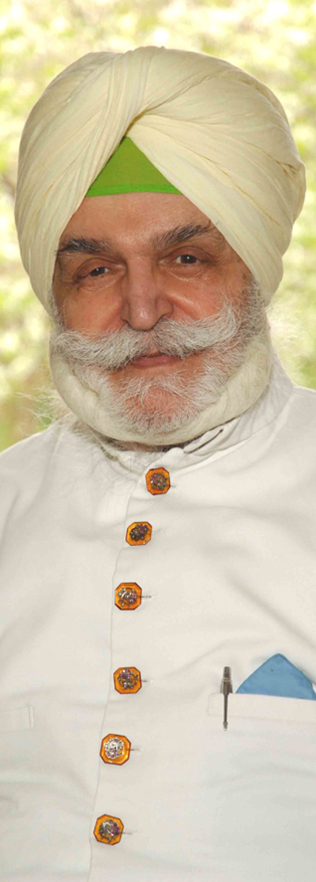 |
R.I.P. Raja Mrigendra Singh 1929 - 2014 |
Raja Mrigendra Singh, a son of Late Maharaja Bhupendra Singh of the erstwhile royal family of Patiala, passed away on March 24, 2014 at the age of 85. He was brother of Yadavindra Singh, the last Maharaja of Patiala.
He was ailing in a New York hospital for two-months before his last breath.
Raja ji, as his friends and admirers called him, was a scion of the Sikh Royal Family of Patiala, a family that exerted a determining influence of the Sikhs far beyond its borders.
What is another unique aspect of Mrigendra Singh's loss is that he was a leading torch-bearer of the Nirmala tradition in the West. In that position he was promoting traditional renditions of Sikh Scriptures and their exegesis, besides Patiala Gharana musical tradition of Gurbani Kirtan, in the English language. He was among the very few who were able to write and teach Nirmala tradition in English language.
He confided in me once that this was his sole purpose to migrate to USA, to pursue studies of theology and musicology in the English language. He joined Yale University to be fluent in theological lingua in English.
According to Sikh tradition, Guru Gobind Singh sent a group of Sikhs to Benares, where Hindu Brahmins held a strangle-hold monopoly on the study of scriptures, for the express purpose of acquiring knowledge about all extant theologies in order to establish institutions of higher learning in Gurmat and comparative religion within the Sikh community.
Upon their return, Guru Gobind Singh gave these newly formulated Sikh schools the title 'nirmala', literally 'immaculate' or 'without blemish."
When Guru Sahib left for South India, he put the Nirmala institutions under the supervision of Bhai Dharam Singh and Bhai Daya Singh (two of the First Punj Pyarey). Many of the Sikh scholars of the 19th century were products of these institutions.
Nirmalas were scholars of the languages, music systems and writings of the subcontinent, and have been amongst the primary sources of religious learning in our community ever since.
However, it wasn't until Mrigendra Singh migrated oversees to establish himself as a Nirmala Sikh scholar that the first serious inroad was made into exposing the Nimala tradition Sikh formations to the West.
He was already fluent in English while in Punjab but acquired the western methodology of religious studies in a number of North American educational institutions.
Mrigendra Singh came to USA in 1972 on a scholarship to Yale University Divinity School. He lived in New York for over 40 years. There, he became a teacher of the Sikh Religion and its music of the Patiala Gharana.
I was living in Rhode Island several years ago, when I had the good fortune of meeting him. We continued our friendship thereafter through visits and correspondence.
I learned a lot from him and found him to be a walking library of Sikh theology, history and traditions.
He had superb memory. I took notes of our many conversations on the traditions of Panth, and on subjects such as the Khalsa, Sehajdhari Sikhs, and the religions of South Asia, as well as delved into translations of certain difficult verses in Gurbani. I also have six hours of video recordings on his understanding of the Mool Mantar, the commencing verses of the Guru Granth Sahib.
Someday, I hope to edit and share them.
We had plans to record his interpretation of the Siddh Gosht, but it remains incomplete. He also sent me a number of his yet unpublished papers to review.
I also had privilege of personally listening to kirtan sung by him in the musical forms that had been handed down from the times of the Gurus.
Mrigendra Singh had earned a Ph D from Guru Nanak University in Amritsar, following a Master's in Music from the Gandharv Maha Vidyalay, Bombay. He was trained in special fields of classical music. Bhai Mehboob Ali of the Patiala Gharana trained him in the Sitar, Sur-Bahar and Veena. Akhtar Hussein Khan, also of the Patiala Gharana, trained him in vocals. There were many other royal court musicians who constantly guided him in honing his musical skills.
He was the recipient of many prestigious honours and awards, including the Sangeet Natak Academy Tagore Fellowship and the Honor Bukhara by King Mohammed Zahir Shah of Afghanistan.
His concerts were highlights of events such as the Bhai Mardana Music Conference and the Mughal Sur-Bahar Concert. He inaugurated the Guru Ram Das Sangeet Vidyala at Amritsar.
He published books such as 'Shri Jaap Nishaan', 'The Patiala Gharana Music Tradition', 'Patiala Gharane ka Sangit ka Udgam aur Vikas", 'North India's Patiala Classical Musical Traditions', 'Mughal Shahi Gavaiya Khan Sahib Tan-Ras Khan', and many research papers on the music of the subcontinent.
The first volume of his monumental work on the translations of the Japji Sahib -- in accordance with the Nirmala tradition -- was published by Punjabi University in March 2014.
Raja Mrigendra Singh is survived by his wife of almost 60-years, Rani Harinder Kaur, four children and several grandchildren. Guru Panth will certainly miss Raja ji in times to come.
Modified from: http://www.sikhchic.com/people/
Contact:
Harbans Lal
[email protected]
April 4, 2014
---------------------------------
Recommended Reading:
http://www.sikhchic.com/article-detail.php?cat=8&id=4932
